Sarah Sundin's Blog, page 530
March 4, 2011
Today in World War II History
70 Years Ago—Mar. 4, 1941: British & Norwegian commandos raid Lofoten Islands, Norway; destroy oil plants, free 300 Norwegian POWs and take 200 German prisoners.
Published on March 04, 2011 03:00
Hesitate....or Go?
 A call from God can be a scary thing. He asks you to do something new, weird, or dangerous—something you feel ill-equipped to do. Something that might turn your life upside-down.
A call from God can be a scary thing. He asks you to do something new, weird, or dangerous—something you feel ill-equipped to do. Something that might turn your life upside-down.Imagine Moses at the burning bush when God tells him to leave his life of shepherding, return to Egypt where he murdered a man, talk to Pharaoh, and bring the Israelites out of Egypt and into the Promised Land. New, weird, dangerous. Moses felt ill-equipped, and God's task would turn his life upside-down.
Moses has objections. God answers them. And I paraphrase from Exodus chapters 3 and 4…
Moses: "Who am I to do this?"
God: "I will be with you."
Moses: "Who shall I say sent me?"
God: "Say that the God of your fathers, 'I AM WHO I AM' sent you."
Moses: "What if they don't believe me?"
God gives Moses three miraculous signs for proof the Lord sent him.
Moses: "But I'm slow of speech and tongue."
God: "Go! I will help you speak."
Moses: "Please send someone else."
Then God's anger burned. He sent Moses' brother Aaron to be his spokesman.
A little hesitation is normal and appropriate. After all, we have to make sure the plan comes from the Lord and not our own imagination. God honors those questions. But at a certain point, we need to bypass our fears, step out in faith, and act. The Lord will equip us for any assignment He gives us.
When God called me to write, it was definitely new and weird for this pharmacist/stay-at-home mom. I was completely unequipped, and even my early forays into writing turned my household upside-down. But whenever I found myself hesitating, I repeated God's words to Moses in Exodus 4:12: "'Now go; I will help you speak and will teach you what to say.'" That became my theme verse as I ventured into the strange new world of the publishing industry.
Are you facing a new, weird, or dangerous assignment from God? What can you learn from Moses?
Published on March 04, 2011 03:00
March 2, 2011
Book Beat - The Gathering Storm
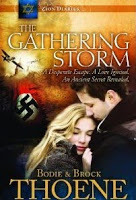 Bodie and Brock Thoene have set the standard in historical fiction with their exquisite attention to history and engaging plots and characters, so I was thrilled to read their newest novel. The Gathering Storm is the first novel in the Zion Diaries series, but it stands alone.
Bodie and Brock Thoene have set the standard in historical fiction with their exquisite attention to history and engaging plots and characters, so I was thrilled to read their newest novel. The Gathering Storm is the first novel in the Zion Diaries series, but it stands alone.The Gathering Storm introduces the Bittick family, missionaries serving in Germany before World War II. Young Loralai comes of age in the early days of Nazi Germany, torn between an adolescent crush on Eben Golah, a mysterious older man, and her affection for Varrick Kepler, a Jewish classmate. Loralai marries Varrick to help him escape Germany. In Belgium, their safety is again threatened by the German invasion in May 1940. Loralai escapes to England, where she finds new purpose in helping Jewish refugees.
The Thoenes' attention to historical accuracy shines. The scenes where Loralai's family flee Belgium by car, by foot, and by boat are thrilling and emotional. I was also struck by the plight of the Jewish refugees, who escaped tyranny in continental Europe only to find a surprising amount of prejudice in Britain. Those who love fiction set in World War II will find much to enjoy in this novel. However, there is a plot element which is mystical/supernatural. I found this element intriguing and based on biblical truths, but if you like your historical fiction straight, this might not appeal to you.
I'm very much looking forward to the next novels in this series.
Published on March 02, 2011 05:00
Today in World War II History
70 Years Ago—Mar. 2, 1941: Germans occupy Bulgaria on way to Greece.
Published on March 02, 2011 03:00
March 1, 2011
Today in World War II History
70 Years Ago—Mar. 1, 1941: Bulgaria signs Tripartite Pact. Free French take Kufra Oasis, Libya after 22-day siege. Bread ration in Italy cut in half. US Navy establishes Support Force Atlantic Fleet to protect convoys.
Published on March 01, 2011 03:00
February 28, 2011
Make It Do - Rationing of Canned Goods in World War II
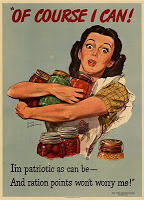
Rationing of processed foods was an important part of life on the US Home Front. A complex and constantly changing system kept the grocery shopper on her toes.
Why processed foods?
Tin was short. The Japanese controlled 70 percent of the world's tin supply. Tin's resistance to temperature, shock, and moisture made it an ideal packaging material. The US military used tin for ration tins, ammunition boxes, plasma containers, and for morphine syrettes. The use of tin for civilian purposes had to be curtailed, which meant rationing of canned goods.
Food was in high demand. In addition to meeting civilian needs, US farms also fed the military and the Allies. However, an agricultural labor shortage due to the draft and the internment of Japanese-Americans strained the system. Reducing civilian usage of processed fruit and vegetable products through rationing helped reduce the strain.
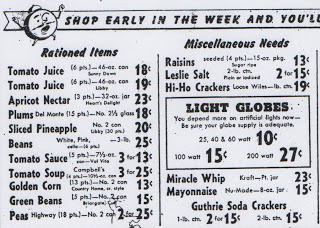
Which processed foods were rationed?
Starting March 1, 1943, three hundred items were rationed, including canned or bottled or frozen fruits and vegetables, canned or bottled juices and soups, and dried fruits. Fresh fruits and vegetables were not rationed, nor were pickles, relishes, or Jell-O.
Points
Each rationed item was assigned a point value, which varied over time due to supply, demand, and region. The job of the grocer became more complicated. Products had to be labeled not only with price but with point value. Each month, point values changed, and the grocer had to re-label.
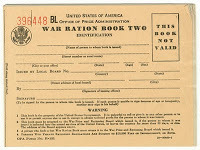
War Ration Book Two
On March 1, 1943, War Ration Book Two became active. The blue stamps provided 48 points worth of processed foods each month. This supplied 33 pounds of canned goods per person per year, which was 13 pounds less than pre-war usage. Rationing calendars were published in the newspapers to help people keep track of which stamps were current. Stamps were good for eight, five, two, or one points each, with no "change" given, so the shopper had to be careful to use the exact number of points. To prevent fraud, the stamps had to be torn off in the presence of the grocer.
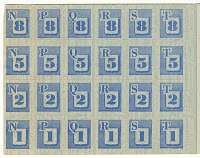
War Ration Books Three and Four
Book Three became active in September 1943, but was replaced by Book Four on November 1, 1943. The system was simplified on February 27, 1944, when all stamps became worth 10 points, and plastic tokens were issued as change.
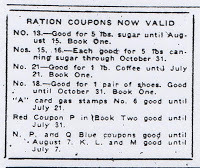
Fluctuations
Point values changed frequently, and items were often removed from or returned to rationing based on the harvest. On September 17, 1944 after a good harvest—and in preparation for the presidential election—all processed foods except canned fruit were removed from rationing, but were returned to rationing on January 1, 1945 due to the demands of the Battle of the Bulge. After V-J Day on August 15, 1945, processed foods were no longer rationed.
Victory Gardens
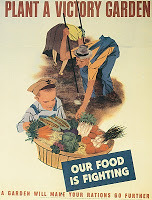
People were encouraged to plant Victory Gardens to reduce the amount of processed foods needed. Newspapers and magazines published how-to articles, and gardens sprang up in backyards, vacant lots, big-city window-boxes, and even on community property. By the end of 1943, Victory Gardens supplied 40 percent of civilian needs for fruits and vegetables.
Canning
To put up this bounty, home canning was encouraged. A poll in January 1944 found that 75 percent of housewives canned, and those women canned an average of 165 jars per year. This met the family's needs and preserved ration points for foods they couldn't grow. Extra canned fruits and vegetables were often donated to the needy.
How would you like to deal with a system like this?
Published on February 28, 2011 05:00
Today in World War II History
70 Years Ago—Feb. 28, 1941: Vichy France reduces bread ration to 280 grams per person per week. German troops occupy Hungary with Hungarian government's consent.
Published on February 28, 2011 03:00
February 27, 2011
Today in World War II History
70 Years Ago—Feb. 27, 1941: Academy Awards: Best movie of 1940—Rebecca, best actor—Jimmy Stewart in Philadelphia Story, best actress—Ginger Rogers in Kitty Foyle, best director—John Ford for The Grapes of Wrath.
Published on February 27, 2011 03:00
February 25, 2011
Daisy Speaks
 This is Daisy the yellow lab speaking. All my life I've listened to "Mom" make false and unkind allegations against me. I've hijacked this blog. It's my turn to have a say, which isn't easy when you have to type with paws. She can have the blog back if she meets my conditions.
This is Daisy the yellow lab speaking. All my life I've listened to "Mom" make false and unkind allegations against me. I've hijacked this blog. It's my turn to have a say, which isn't easy when you have to type with paws. She can have the blog back if she meets my conditions.Condition #1: More Bully Sticks
Whine, whine, whine—Mom won't stop whining about how I chew things up. Wooden spoons, Bible covers, retainers, reading glasses, but can you blame me? Aside from the fact that they're tasty, I'm a lab. I need to chew. All the time. Give me bully sticks and lots of them. I love those pressed meat by-product sticks o' goodness. Who wouldn't?
Condition #2: More Play
Sure, I get a couple walks a day, and Mom lets me chase the Magic Light—she calls it a laser pointer, but I call it the little red dot of joy. But the Magic Light only comes out for half an hour a day! Can you believe it?
Condition #3: More Belly Rubs and Ear Scratches
Who could resist this lovely belly? These soft floppy ears? Mom can. Would you believe she prefers that lighted box thingy and tapping her fingers on those little squares—to rubbing my belly? She stares at that screen like some stupid cat—and believe me, cats are stupid. Mom needs to get a life.
Condition #3: Heated Pool
A girl needs her daily swim to keep her figure svelte. But come on, Mom, I get in the pool and have to get right out! It's February. The pool is cold. I need to swim. Enough said.
Condition #4: Full Access to the Down Comforter
You get the cozy bed with the down comforter. I get the pillow on the floor. Does that sound fair to you? This needs to change now.
Condition #5: Equal Time on Facebook
That's the American way, isn't it? You accuse me. I deserve a rebuttal. Equal space, that's all I ask.
There's more, but my paws are sore. And I need to chew something. And this "mouse?" It's not an actual mouse. It does have a piquant aftertaste, however.
Published on February 25, 2011 05:00
Today in World War II History
70 Years Ago—Feb. 25, 1941: British and Nigerian troops take Mogadishu, capital of Italian Somaliland. First delivery of Martin B-26 Marauder medium bombers to US Army Air Force.
Published on February 25, 2011 03:00



